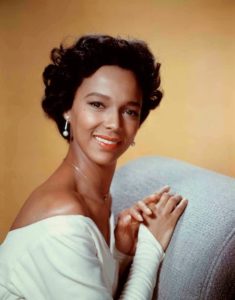
Dorothy Dandridge
*This date marks the birth of Dorothy Dandridge in 1922. She was a Black actress, singer, dancer, and entertainer.
Dorothy Jean Dandridge was from Cleveland, Ohio; her mother was an aspiring actress named Ruby Dandridge. Ruby had left Dorothy's father and moved into an apartment with a friend (Geneva Williams) who became instrumental in teaching Dorothy and her sister singing, dancing, and piano. They moved to Nashville and were signed with the National Baptist Convention to tour churches throughout the southern states. The Great Depression halted progress, and they moved to Hollywood. As they were known, the Dandridge Sisters received an unaccredited cameo in the film The Big Broadcast of 1936. They also played the Cotton Club, where they were a hit and soon toured Europe.
The girls returned to Hollywood but eventually split up partly due to Dandridge's increasing desire for a solo career. In 1942, she married Harold Nicholas, a daughter; Lynn was born a year later. By the time Lynn was two, she noticed that Lynn was not acting normally; she was soon diagnosed as disabled. Harold was often on the road touring and did not offer much support. 1949, they divorced, and Ruby and Geneva looked after Lynn while Dandridge tried to re-establish her career. She still wanted to act in films but realized that possibility was slim.
She did not relish returning to nightclubs, especially in Las Vegas, where racism was almost as bad as in the South. The reviews were very good, which would help her get film work at The Mocambo in Hollywood and numerous guest television appearances. MGM offered, and Dorothy accepted a role in an all-black drama called Bright Road. The film opened in April of 1953 to good reviews.
When Dandridge heard that an all-Black production of Carmen Jones was being planned, she knew this was the role she had dreamed of. The project was the mastermind of Austrian director Otto Preminger. Carmen Jones was a resounding success, and Dandridge was the first black woman nominated for Best Actress. In 1959, came the film Porgy and Bess. She reluctantly accepted, but the entire shoot was to be an unhappy one, and the reviews were mediocre.
However, she won a Golden Globe Award for her performance. Dorothy's life seemed to unravel later that year. In 1963, she declared bankruptcy, continued to drink heavily, was a very lonely woman, and often sounded disoriented. She was given a prescription antidepressant drug that seemed to lift her spirits. On September 8, 1965, Dorothy Dandridge was found dead on the bathroom floor. Her death was from an overdose of the antidepressant that she was taking. Dorothy's daughter, Harolyn, still lives in a California institution.
Great African American Women
By Darryl Lyman
Jonathan David Publisher, Inc. Middle Village, NY
Copyright 1999
ISBN 0-8246-0412-1